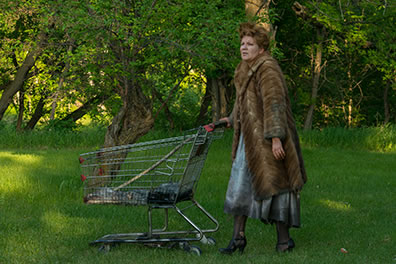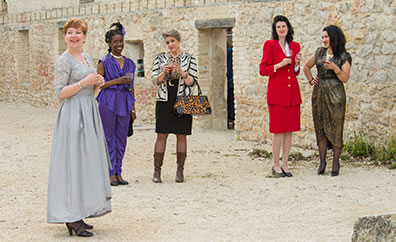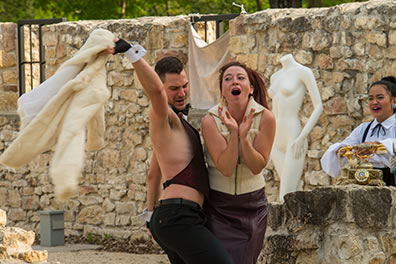Timon of Athens
Capitalism Rises and Falls in a Ruin
Shakespeare in the Ruins, Trappist Monastery Provincial Heritage Park, Winnipeg, Manitoba
Wednesday, June 6, 2018, promenade production
Directed and adapted by Michelle Boulet

Timon (Sarah Constible), emerges from the woods in the Shakespeare in the Ruins production of William Shakespeare's Timon of Athens. The Winnipeg, Manitoba, theater company stages the production on the grounds of the Trappist Monastery Provincial Heritage Park. Photo by Dano Tanaka, Shakespeare in the Ruins.
Sarah Constible, dressed in a blue lace ballgown, is standing before a half-formed stone wall as she delivers Timon's rhetorical primal scream. This Athenian lady, who had lavished her friends and flatterers with expensive gifts and parties and ends up bankrupt and abandoned, unleashes the full force of her fierce anger combined with the riving pain of a person betrayed. Her words cut through the breezy summer air across the width of a nave to clench our guts in a knot. She curses her coterie for acts of ingratitude in the face of avowed gratitude and condemns her society for its indifference in the wake of her many contributions. Then she turns and walks away into self-banishment. The next time we see her, she is wearing a dirty fur coat and tattered gown, holes in her hose down to her high heels, ferocity still darting from her eyes and her hair looking as if it were frightened out of its wits. She is pushing a grunged-up shopping cart out of the woods.
None of this is in a theater or on a stage, by the way. That's a real remnant of wall Constible is standing behind, a church's nave measuring the distance between her and us, and real trees bordering a meadow beyond. This is Shakespeare in the Ruins, not a figurative description but a literal one and the name of the Winnipeg, Manitoba, theater company that stages promenade productions (or "moveable theater") at the stonewall remains of a Trappist monastery south of the city. Constible is playing the title character of Timon of Athens, credited to William Shakespeare in a probable collaboration with Thomas Middleton. Neither were having their best days when writing this play. It reads like a first, unfinished draft, and could very well be as no record exists of the play being performed in either's lifetime. Nevertheless, even on his worst day, Shakespeare could outwrite his colleagues, and that Act IV, Scene 1, speech he wrote for Timon at the pivotal point of this play is one of his canon's most rip-roaring pieces of rhetoric, and Constible makes it the cornerstone of her regendered and time-transported portrayal of Timon.
And what a stage for a play about financial and social ruin: a spiritual ruin. The Order of Cistercians of the Strict Observance (known as Trappists) founded Our Lady of the Prairies here in 1892 and erected the stone church in 1903 and the monastic wing in 1905. Worried about encroachment from urban sprawl, the monks moved to a different location in 1978, and a fire gutted the buildings in 1983, leaving only the stone walls. The property became a heritage site five years later. Five years after that, in 1993, Shakespeare in the Ruins began performing here.
For this production of Timon of Athens, we start at the two-story peaked entrance to the church, where a few rows of collapsible chairs have been set up. The church's nave serves as Timon's palatial home for the parties and dinners (a crumbled wall serving as the bar). Timon's household staff takes us "traveling and begging" for loans to help Timon out of his bankruptcy. We go back to the front façade, now doubling as a gym, to the residential wing jutting out from the rear of the nave, and to a tea party and operatic recital on one of the adjoining lawns. The play's entire second half is staged in the meadow, except the final scene back at the church entrance. The actors are not wearing microphones, but they are trained in the art of projection, and their dialogues withstand the occasional ambient aural intrusions: jet aircraft passing overhead, a train nearby, a motorcycle nearer by, and, on this night, a drone hovering above us capturing photographic images of the production.
As we wait for the show to begin at the church entrance, a jeans-clad busker with an electric guitar sings the Pretenders' "Brass in Pocket" and Patti Smith's "Free Money." Shakespeare in the Ruins founding member and Artistic Director Michelle Boulet, who helmed this production, gives a preshow speech, including instructions on how to easily fold and carry the chairs from scene to scene. "Come on, man, you're on my corner," the busker says as Boulet is finishing up her announcements, and we are underway, ambulatorily and thematically.
That busker is a multidimensional key to the production we're about to see. Her late 1970s songs trended into the early 1980s, when this production is set—specifically, 1983 New York City. She shows up occasionally as we walk from one scene to another (any money we put in her hat goes to Actors' Fund of Canada). When she's not a busker, Claire Thérèse is a Jeweler, or a Debt Collector, or a Contractor, or a Thief, or Ventidius, the friend whom Timon bails out of bankruptcy. It's a shock at play's end when only nine women take their bows. I could have sworn I saw a cast of 20 quality actors, such is the effectiveness of their doubling, quadrupling, and quintupling of roles, Thérèse in particular achieving a half-dozen indelible portrayals (on top of the quick-change requirements in a space like this).
Though this production has been promoted as having an all-female cast, Boulet has actually just regendered the play. All of the script's named or occupationally identified roles are played by women as women, but the entertainment at Timon's party is regendered, too. This production turns what the stage directions describe as a "Masque of ladies dressed as Amazons, with lutes in their hands, dancing and playing" into a trio of gentlemen dressed as Chippendales, with hardly anything on their torsos, dancing and grinding. One ends up doing a dance directed at my mesmerized wife while another is all over a thrilled-to-screaming Ventidius. As we leave the party and walk out of a door at the side of the nave, Ventidius with empty wine bottle in hand is lying on the lawn with two of the dancers, all three blissfully passed out.
Boulet told me in an interview that when she experienced the play for the first time in the 2017 Stratford Festival season—she hadn't read it before seeing it—she immediately saw that the play has no gender-specific dynamics, despite the testosterone-heavy dramatis personae (the only women in the script are those masquers and two whores who accompany the warrior Alcibiades in his wars). What struck Boulet most was "how modern the play seems." When Shakespeare and Middleton penned the play around 1605, "banking and commerce existed, but in a precapitalist form. The same goes for the play's Ancient Greek setting," she writes in her program notes. "Yet, how the work deals with money and its nasty sway over people is eerily transcendent."
Her choice for a 1983 New York setting— big hair, big money, and bigger egos, when pop art got wrapped into the world of high finance and hedonistic behavior—shapes the production more than does the regendering. Gold telephone, exotic decorative glassware, modern art paintings, and a nude female mannequin are part of Timon's décor. The socialites don glittering dresses and gowns and the servants wear cocktail waitress tuxes—black jackets, shorts, and stockings and gray puffy shirts with cravat collars—while Apemantus (Andrea del Campo) arrives at Timon's party in rust red jacket, olive green slacks, blue pinstripe shirt, and oversize tie. Taking swigs of water from a flask, she sings The Jazz Butcher's "Partytime": "This is partytime, I could look at all the girls that are in this room. This is partytime, I could think of what would happen if one took me home." Instead of a "bay courser," Timon gives one of his guests the keys to a "blue Corvette." Toward the end of the party, three creditors in black trench coats, blonde wigs, and sunglasses peer over the walls. After the guests have left, the three creditors stride purposely, their high heels grinding the gravel beneath them, into the great hall to demand that Timon address their "note[s] of certain dues." Though plenty of rocks are at hand, Constible's Timon doesn't use them at the faux banquet for her faux friends. Rather, she simply lets fly their drinks in their faces and douses them and their fur coats with the spray of a seltzer bottle, which is enough to send the ladies fleeing.
The 1983 New York setting has its biggest impact on the role and subplot of Alcibiades, the "Athenian captain" who is banished from the city and returns with an invading army. Boulet blows up the subplot and turns Alcibiades, played by Toni Reimer, into a real estate mogul, essentially conquering the city through aggressive property accumulation (Boulet also excises the senators; it's bankers who deny Timon's pleas for help in the play's first half, and leading socialites in the second half who try to convince Timon to return to the city to stave off Alcibiades' hostile takeovers). Boulet splits the role of Lucius and gives Alcibiades the scene in which Lucius turns down Timon's request for an emergency loan. This would seem to create a textual disconnect, as Alcibiades is Timon's one stalwart friend in the text and in the play's second half tries to enlist him to join in his invasion of Athens. Lucius (now Alcibiades), among Timon's deniers, at least offers a plausable reason—"How unluckily it happened that I should purchase the day before for a little part"—that Reimer's Alciebiades speaks as an honest fact rather than disingenuous excuse. She even points to the model of the "little part" she had purchased.
"Little part," right. Reimer's Alcibiades is, in fact, a regendered Donald Trump, who opened Trump Tower in 1983. Reimer in a red dress suit maintains a stern aspect throughout the play, which makes for interesting dynamics as she tries to convince the misanthropically extreme Timon in the woods to return to the city and join her enterprise. In the play's final scene, Reimer places a sign on Timon's former home (the church's façade) announcing "Future home of Alcibiades Towers." Was Reimer's Alcibiades conniving behind Timon's back (the model she had pointed to was labeled "Alcibiades Tower") or just being opportunistic? We get no ready answer, though Timon's line to her in the woods, "Thou was born to conquer my estate" (estate replacing country in the text) tells you what Timon believes.


Top, Timon (Sarah Constible, left) welcomes guests to her party: from left, Lucullus (Lorraine James), Sempronius (Melanie Whyte), Alcibiades (Toni Reimer), and Lucius (Julie Lumsden). Above, Ventidius (Claire Thérèse) enjoys the attention of one of Timon's dancers (Davin Furtado) as Lucilius (Hera Nalam) watches. Photos by Dano Tanaka, Shakespeare in the Ruins.
Though losing the warrior persona of Alcibiades alters some of the play's subtle thematic arcs, Boulet's adaptation maintains the satirical portrait of status-conscious flatterers who measure friendship in dollars. Along the way, Boulet brings home the play's thematic point of money's decaying effects. Boulet adds a further moral that came about when she needed a new ending with no Alcibiades-led army to enter Athens. She found her ending by making the bulk of Act IV, Scene 2, the production's final scene, as Timon's loyal steward, Flavius (Brittany Hunter), shares "the latest of my wealth" with the other displaced employees of the Timon household (Flavius's soliloquy at the end of the scene about continuing to serve Timon remains in its original place back before she visits Timon in the woods). With the servants' scene shifted to the end, the money Flavius shares with her fellows is that which Timon found in the woods and gave the steward. Their group hug at party illustrates how Flavius and her servant-class peers have what Timon incorrectly believed she had early in the play when she tells Flavius, "I am wealthy in my friends."
For all the script massaging, roles regendering, and promenading this production relies on, the most significant thing to emerge from the landscape is the quality acting. The corps is generally strong and well-versed in delivering the Shakespeare-Middleton lines, but two performances particularly flesh out the playwrights' draft characters. Hunter's Flavius does more than show devoted duty and bravely provide truth to power for Timon; she becomes a visual chorus. Off to the side, she silently reacts with concern to each mega-bill Timon ratchets up, for the dowry for his servant Lucilius, for the jeweler's jewel, for the painter's painting, and on and on. She doesn't think much of the painting either.
In finding the balancing act of a Timon who never knew "the middle of humanity…but the extremity of both ends," as Apemantus says of the title character, Constible chooses an interesting throughput strand: empathy. In the play's first half, her Timon is unwaveringly friendly and nonjudgmental to everyone, and even seems to dote on Apemantus. "Thou'rt an Athenian, therefore welcome," she says, setting herself apart from the other ladies who look down their snobbish noses at Apemantus. Later, Timon tells Apemantus, "I have often wished myself poorer, that I might come nearer to you," a line Constible delivers with genuine affection rather than jesting cynicism. How much greater Timon's tragedy, then, as her friends' betrayal reaches to her very soul, vacuuming all the empathy right out of her persona. Constible displays her technical skills with that centerpiece speech, which we can hear and feel from at least 50 feet away. She mines the depths of her art in the play's second half, starting with when she first appears as a once-expensively-clothed shopping cart pusher suspiciously taking in her surroundings. Waiting for the audience to settle in to their moved seats at the end of intermission, Constible stares up at the drone with a distractedly puzzled look—anachronistic for 1983, but perfect for this Timon. At the end of her argument with Apemantus in the woods, the two shout one-word insults at each other. "Rogue!!" Constible's Timon yells at the departing Apemantus, who doesn't answer. "Rogue!!!" Timon screams. "Rogue," she says plaintively to—whom? "I am sick of this false world, and will love nought but even the mere necessities upon't." She's lost empathy even for herself and now prepares her grave.
During intermission, I overhear a patron reading in her program that in the next scene, Timon, while digging for roots, finds a big bag of money. "So, there's hope," the patron tells her companion. "There's got to be a happy ending." Nope. Shakespeare and Middleton may not have finished the job, but what they gave us is "eerily transcendent." Still.
Eric Minton
January 16, 2019
Comment: e-mail editorial@shakespeareances.com
Start a discussion in the Bardroom




 Find additional Shakespeareances
Find additional Shakespeareances